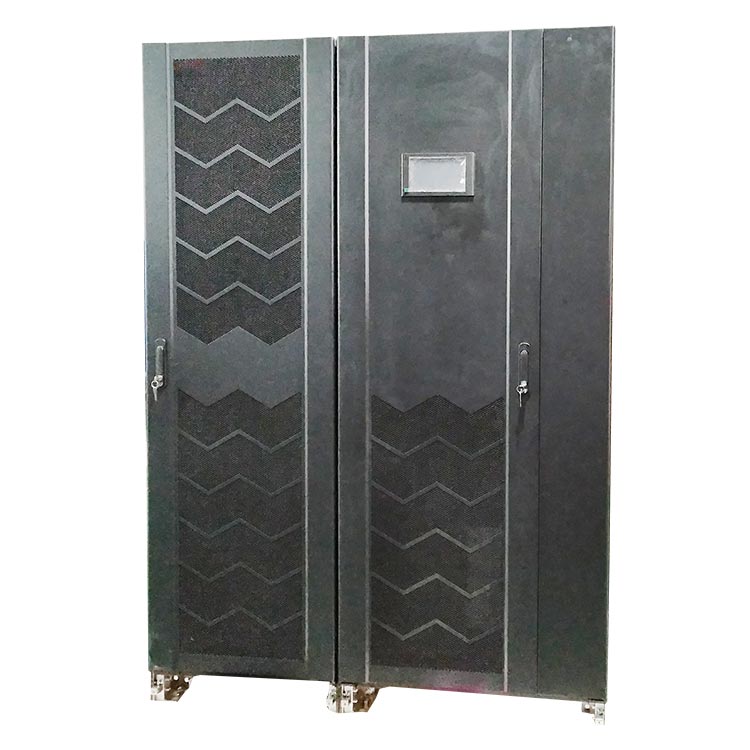 【Origin Pic】 |
Industrial power supply maintenance EA660-600kVA
Power range:200kVA-800kVA
Application areas:Data processing center, computer room, telecommunications |
EA660 series is a three-in-three-out high-frequency modular UPS newly launched by Easystar. The product adopts full digital control technology. The maximum capacity of a single machine can be expanded to 800kVA; it includes power modules, bypass modules, and control modules. Support hot swap operation. The EA660 series UPS adopts a large-screen touch-screen LCD design and a menu-style architecture. Various information of the UPS can be monitored through the LCD, so that all operations are clear at a glance.
200kVA-800kVA
Application field:Data processing center, computer room, telecommunications, finance, securities, transportation, taxation, medical treatment, industrial automation
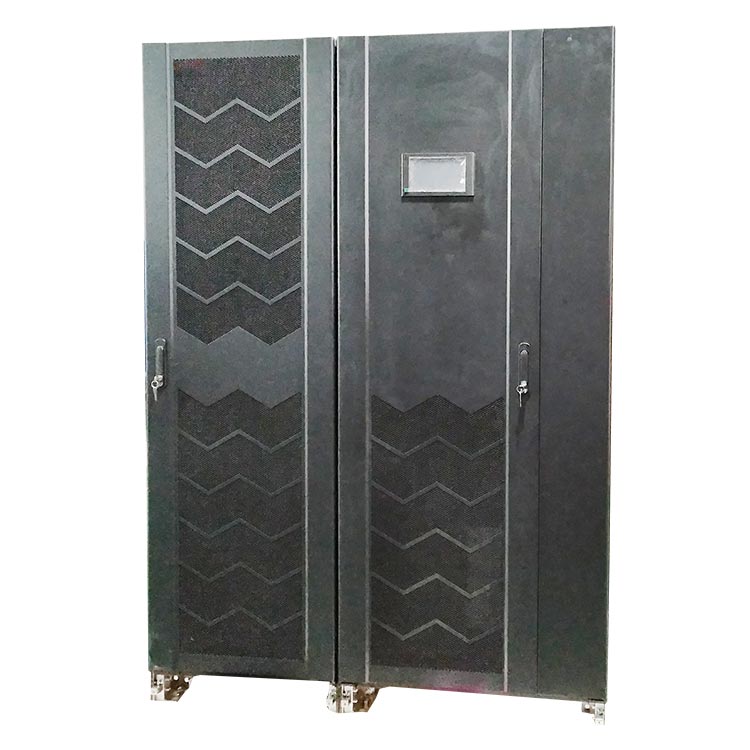
EA660 series are online products, which are composed of power modules, bypass modules, system monitoring modules, cabinets and battery packs. Adopt modular technology, easy to maintain and easy to expand. The modules are all intelligently controlled by DSP (Digital Signal Processing). The power module is composed of a rectifier and an inverter. Through high-frequency switching technology, the input is transformed into a pure, high-quality sine wave output. The principle block diagram is shown in the figure.
Principle block diagram
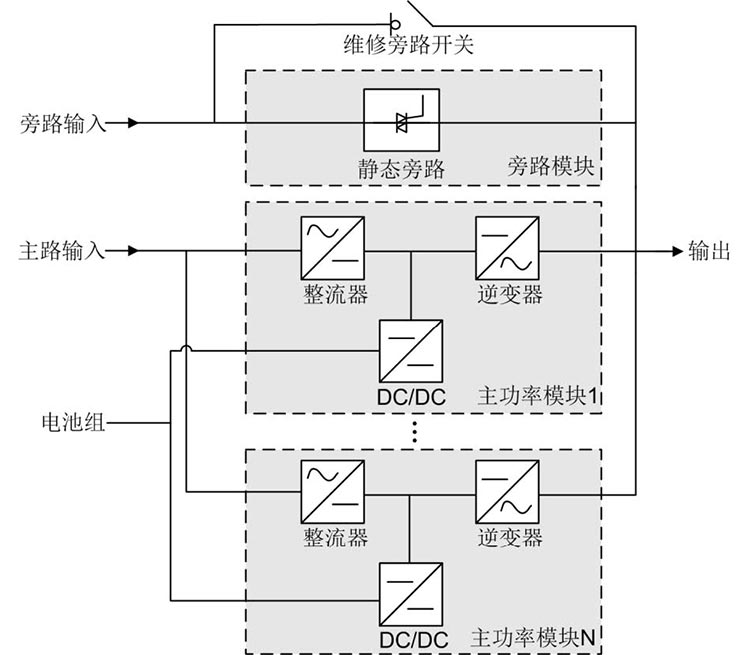
UPS Normal working mode, the AC input is rectified by the rectifier, converted from AC to DC, and then reversed by the inverter, converted from DC to AC output. After the two-stage conversion, the output voltage with good accuracy and quality can be obtained, which can prevent the input harmonics, burrs, voltage transients and other interference from affecting the load. The working principle is shown in the figure.
Principle block diagram of main road mode

When the UPS detects that the power module is overheated, overloaded, or other faults that will shut down the inverter, it will automatically switch to the bypass. The bypass power supply will directly provide energy to the load. In the bypass mode, the quality of the load power supply is not protected by UPS, and is easily affected by abnormal conditions such as power outages, AC voltage waveforms or abnormal frequencies. The working principle of bypass mode is shown in the figure.
Schematic diagram of bypass mode

When the AC input of the rectifier is abnormal, the UPS will work in battery mode. At this time, the power device obtains energy from the battery, which is converted into AC by the inverter and then output. The working principle of battery mode is shown in the figure. When the AC input of the rectifier is abnormal, the UPS will work in battery mode. At this time, the power module obtains energy from the battery, which is converted into AC by the inverter and then output. The working principle of battery mode is shown in the figure.
Block diagram of battery mode
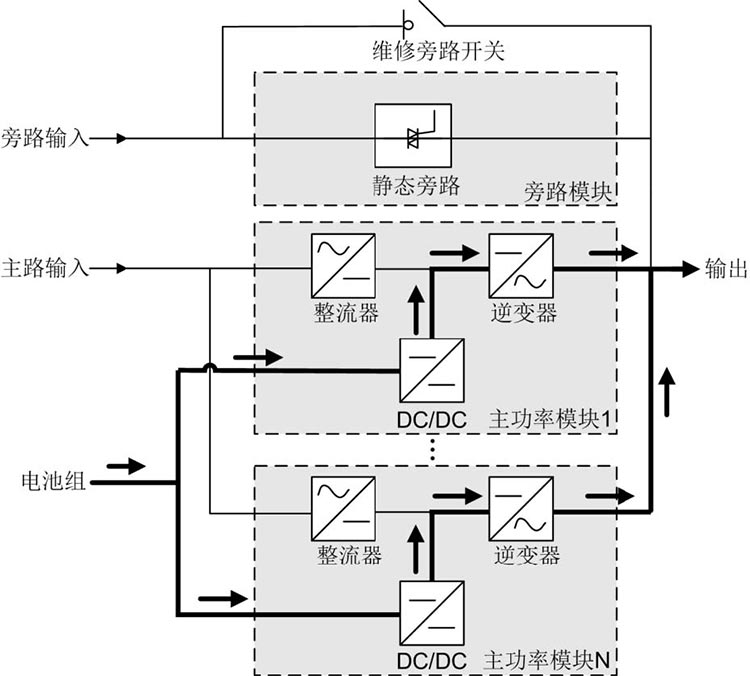
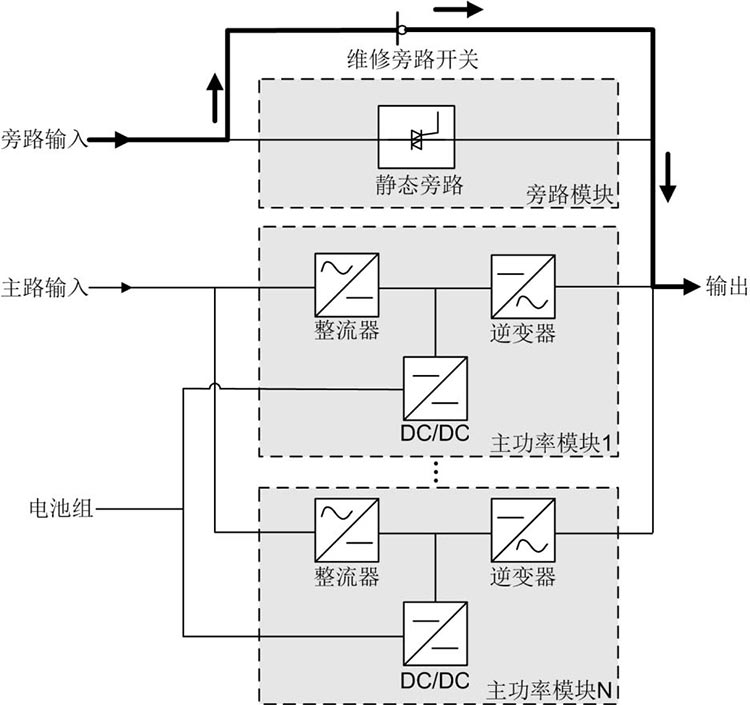
ECO (Energy Control Operation) mode is a UPS power-saving operation mode, this mode can be set through the LCD or WEB interface. In ECO mode, when the bypass source voltage is within the ECO voltage range, the static bypass switch is turned on. At this time, the bypass is powered and the inverter is in the standby state (manual startup is required to ensure that the inverter is in the standby state. Make sure that the energy flow diagram has flowed to the inverter module part). When the bypass source voltage is not within the ECO voltage range, the load will switch from the bypass to the inverter for power supply. Regardless of the bypass or inverter power supply, the rectifier will be in the on state and charge the battery through the charger. This working mode can achieve higher efficiency. The working principle of ECO mode is shown in the figure.
Principle block diagram of ECO mode
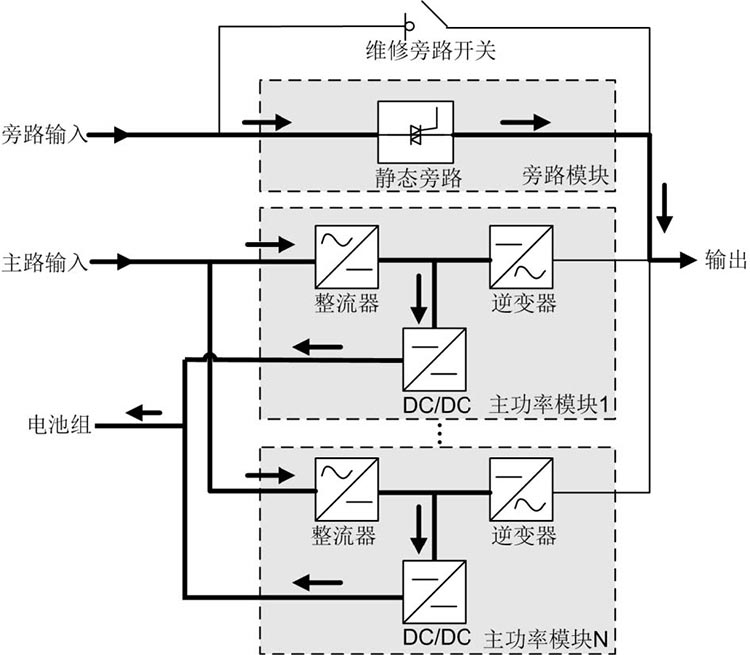
Expanding while growing, effectively saves investment; traditional large-scale UPS power supply systems often adopt a one-step construction mode in order to avoid the risk of power outage caused by midway expansion. This not only greatly increases the initial investment in construction, but also causes the power supply system to operate at low efficiency for a long time.
EA660 adopts modular design, which avoids the disadvantages of traditional UPS system shutdown and capacity expansion, and realizes smooth system upgrade and capacity expansion. The construction of the power supply system of the computer room realizes the hot-swappable expansion of power modules on demand, effectively reducing the initial investment and operating costs of customers.
Average maintenance time is greatly reduced, effectively improving availabilityAvailability is the probability that the system is in a working or usable state when it starts a task. It is generally related to MTBF (Mean Time Between Failures) and MTTR (Mean Time Before Recovery), that is, the larger the MTBF, the higher the system availability. , The smaller the MTTR, the higher the system availability.
The hot-swappable design greatly reduces the system's failure repair time and effectively improves system availability. The trained engineer can replace the faulty module, so that the system can quickly return to normal. The lengthy process of traditional UPS shutdown, analysis, and repair is avoided, and the repair time of the system can be shortened to less than 10 minutes.
3.2 96% ultra-high operating efficiency Maintain high efficiency under low load, the most commonly used load rate segment is the highest efficiency segmentDue to redundant configuration (in order to ensure power supply reliability, UPS systems generally adopt parallel or double bus configuration) and over-configuration (system planning may consider 3-5 years of expansion requirements), the UPS system in traditional data centers has a long-term Operating at a low load rate of 10%-40%, the actual operating efficiency is far lower than the declared efficiency. The power loss caused by UPS can generally reach 6%-10% of the power loss of the entire data center.
EA660 maintains high efficiency under low load, ensuring that customers' UPS can operate efficiently even in the low load rate range of 20%-40%. 96% high efficiency can be maintained at 40% load rate; 95% high efficiency can be maintained at 20% load rate.
Intelligent sleep design to ensure the efficient operation of the UPS system at extremely low load ratesWhen the load rate is very low (10%-15%), EA660 can start the smart sleep to make some modules enter the standby state, increase the system load rate to the optimal range, thereby improving the operating efficiency. Even after sleep, the EA660 system will still have at least one module redundancy, and immediately wake up the sleep module when the system load increases to ensure the safety and reliability of the system.
ECO mode efficiency can reach more than 99%, obtaining the ultimate energy saving effectIn areas with better power grids, the ECO function can be enabled to increase the operating efficiency to more than 98% and save energy costs.
In ECO mode, the load is supplied by the bypass by default (the bypass input permission range can be set), and the inverter is in the standby state.
When the mains power is abnormal, EA660 can quickly switch back to the inverter mode to ensure the quality of load power supply.
3.3 Excellent ease of use Small footprint and friendly engineering interfaceThe power density of a single cabinet can reach up to 800kVA, saving 50% of floor space
Completely front maintenance design, easy to operate
Smart battery management, effectively extending battery lifeIntelligent floating charge conversion and temperature compensation
Enable battery sleep to avoid long-term floating charge and shorten battery life
Automatic detection of battery health, warning can be issued before failure
The number of battery cells is adjustable from 30 to 46, which is easy to maintain
Low harmonics and high power factor, effectively reducing the investment in the distribution systemTHDi<3% & PF>0.99 reduces harmonic pollution to the grid
Soft start technology can increase the ratio of diesel engine to 1:1.1
3.4 Complete reliability guarantee Perfect redundant designRedundant design is adopted for energy control unit and communication bus.
The fan adopts a fault-tolerant design, a single fan failure can still carry 50% load, and two fan failures can carry 30% load
Excellent power grid adaptabilityWide voltage input range: 138-485Vac, 305V-485V can support full load, 138-305V linear derating to 40% load
6kV/5kA lightning protection design, effectively reducing the failure rate of lightning strikes
Excellent environmental adaptabilityIt can work at full load at 40℃, and the charging capacity will not be derated
Reinforced coating of three-proof paint, adapt to harsh environments such as dust and salt spray
★ 4. Technical parameters of EA990 series 150-800kVA UPS products| Type number | EA66200 | EA66300 | EA66400 | EA66500 | EA66600 | EA66800 | |
| Rated system capacity | 200kVA | 300kVA | 400kVA | 500kVA | 600kVA | 800kVA | |
| The number of power modules installed | 4 | 6 | 8 | 10 | 12 | 16 | |
| Rated module capacity | 50kVA | ||||||
| Enter metrics | |||||||
| Enter the number of phases | Three-phase five-wire (3Φ+N+PE) | ||||||
| Enter the rated voltage | 380Vac/400Vac/415Vac | ||||||
| Input voltage variable range | 138-305Vac: 40% derating, 305-485Vac: no derating | ||||||
| Input frequency variation range | 40~70Hz | ||||||
| Input power factor | ≥0.99 | ||||||
| Input current harmonic content | <3% | ||||||
| Battery voltage | ±240 VDC (±180 VDC, ±192 VDC, ±204 VDC, ±216 VDC, ±228 VDC, ±252VDC, ±264VDC, ±276VDC optional) | ||||||
| Number of battery cells | 12V 40 knots (at the same time support 30, 32, 34, 36, 38, 42, 44, 46 knots) | ||||||
| Output indicator | |||||||
| Number of output phases | Three-phase five-wire (3Φ+N+PE) | ||||||
| Output rated voltage | 380Vac/400Vac/415Vac | ||||||
| Output voltage regulation accuracy | ±1% | ||||||
| Output frequency accuracy | Mains mode: track bypass input in synchronization state; battery mode: 50Hz/60Hz±0.25% | ||||||
| Output power factor | 1 | ||||||
| Output waveform distortion degree | ≤1% (resistive load); ≤3% (non-linear load) | ||||||
| Output current crest factor | 3:1 | ||||||
| Inverter overload capacity | Transfer to bypass after 60 minutes at 110% load; transfer to bypass after 10 minutes at 125% load; transfer to bypass after 1 minute at 150% load Bypass; load>150%, turn to bypass in 0.2 seconds | ||||||
| Bypass overload capacity | Load ≤135%, long time operation; load <1000%, lasting 100ms | ||||||
| System indicators | |||||||
| System efficiency | ≥96% | ||||||
| Maximum number of parallel machines | |||||||
| Switching time | 0ms | ||||||
| Protection function | Output short circuit protection, output overload protection, over temperature protection, battery low voltage protection, output over and under voltage protection, input phase loss and phase Sequence protection, fan failure protection, etc. | ||||||
| Communication interface | RS485, dry contact, SNMP card | ||||||
| show show | 7-inch LCD touch screen | ||||||
| Work environment | |||||||
| Operating temperature | 0~40℃ | ||||||
| Storage temperature | -40℃~70℃ (without battery) | ||||||
| Relative humidity | 0%-95% (no condensation) | ||||||
| Altitude | Altitude ≤1000m, over 1000m, derating 1% for every 100m rise | ||||||
| Protection level | IP20 | ||||||
| Noise (1 meter away from the device) | <65dB | <68dB | <70dB | ||||
| Other features | |||||||
| Cabinet size (W×D×H) mm | 600×850×2000 | 1200×850×2000 | 1400×850×2000 | 2400×850×2000 | |||
| Net weight of the cabinet (empty cabinet) kg | 233 | 242 | 415 | 465 | 617 | 1025 | |
| Module net weight kg | 32kg (power module) | ||||||